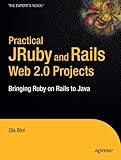Ola Bini
Language Geek, author of "Practical JRuby on Rails Projects"
Ola Bini works as a language geek for ThoughtWorks in Chicago. He is from Sweden but don't hold that against him. He is one of the JRuby core developers and have been involved in JRuby development since 2006. At one point in time, Ola got tired of all existing programming languages and decided to create his own, called Ioke. He has written a book called Practical JRuby on Rails Projects for APress, talked at numerous conferences, and contributed to a large number of open source projects.
His main passion lies in implementation languages, working on regular expression engines, trying to figure out how to create good YAML parsers.
Presentations
We are getting more and more languages - but sometimes the best solution is actually to build one yourself. Whether you choose to build a small DSL or a fullblown language, many of the techniques are the same.
This presentation will discuss the different aspects of implementing a language on top of the JVM. It will cover parsing, a bit about type systems, what the runtime support generally looks like, how you can create a compiler, and many more things.
JRuby is an implementation of the Ruby language for the JVM. It gives full access to the Ruby language while running on top of Java. JRuby is the fastest and most fully-featured implementation of Ruby available.
This presentation will introduce JRuby, cover the reasons for its existance, some of the more useful tools, what's new and exciting in the JRuby world, and what new features JRuby 1.5 brings.
The JVM is the best platform for languages right now - and there are many languages that run on the JVM. Several cover the same kind of space but there are also many interesting outliers.
This presentation will give a whirlwind tour of several interesting languages and take a look at JSR 292, the JSR for adding new language support to Java and how these languages can be used for different purposes.
Books
Practical JRuby on Rails Web 2.0 Projects: Bringing Ruby on Rails to Java (Expert's Voice in Java)
by Ola Bini
-
Discover how JRuby on Rails can be used to create web applications faster and more efficiently while still taking advantage of the vast power of the Java platform.
Ruby on Rails is proving itself to be one of the most efficient and powerful agile web development application frameworks available and has had a profound influence on the Java community. The JRuby project offers Java developers the best of two worlds: the flexibility of Ruby on Rails coupled with the enterprise-level power and maturity of the Java platform.
JRuby core developer Ola Bini covers everything you need to know to take full advantage of what JRuby has to offer, including:
- Full coverage on how to use JRuby to create web applications faster and more efficiently, while continuing to take advantage of the vast power of the Java platform
- Several real-world projects that illustrate the crucial specifics you need to know about the interaction of Java and Ruby
- Helpful, practical instruction and discussion on how web applications can be deployed using a variety of popular servers such as Apache and Mongrel
What you’ll learn
- Create a Rails application that uses JDBC to talk to legacy databases
- Use Java Management Extensions (JMX) to more effectively manage your application
- Deploy a Rails application within a Java Enterprise web container (Tomcat)
- Create interoperable applications involving EJBs and Rails-driven web services
- Securely integrate XML processing into your Ruby applications
- Build cutting-edge Web 2.0 web sites using Rails, Prototype, and script.aculo.us to provide a pleasing user experience
- Build four important projects: Store, CMS, Admin tool, and a web library project
Who this book is for
You'll get the most from this book if you have medium-to-advanced skills in Java web development, with a little Ruby experience, and are interested in taking Web development to the next level, both in terms of speed and features and in interoperability with existing infrastructure.
Table of Contents
- Introduction
- Getting Started
- Introduction to Rails
- Store Administration
- A Database-Driven Shop
- Java Integration
- A Rails CMS
- Content Rendering
- A JRuby Enterprise Bean
- An EJB-Backed Rails Application
- Deployment
- Web Services with JRuby
- JRuby and Message-Oriented Systems
- The LibLib Rails Application
- Coda: Next Steps

